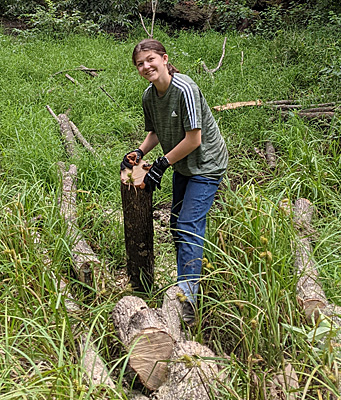Under the leadership of Gerco Hoogeweg, two work days were scheduled at JK Black Oak Wildlife Sanctuary in July. Unusually for July, both days had excellent weather conditions with temperatures in the low 80’s. The focus of both work days was to remove debris from several of the vernal pools. These pools are dry in the summer so we could safely enter without disturbing the amphibians and salamanders that live there when the pools have water.

Photo by Andrea Erbeck
The July 10 work day was attended by 11 people, and we focused on removing downed trees from three of the vernal pools. Within a matter of hours, these trees were cut in smaller pieces and removed to create nearby habitat. We hope that once the trees start decomposing, they will become a good hiding places for salamanders and snakes. We also built several small brush piles to form habitat for a variety of other critters.
During our July 31 work day, attended by 10 people, we focused on removing invasives, downed trees and tires from the LeSabre pool. The LeSabre Pool is the premier pool at the property for wildlife because it has water most of the year. This pool is also the one most impacted by past human activities. Not only did we remove over a dozen old tires, we found bottles, part of a toilet, plastics, a metal box spring set, a mattress, a motorcycle steering handle and at least three rusty bicycle frames. Although we removed a lot from the pool, there is more work to be done. While some volunteers were busy removing debris, others tackled removing invasives including Autumn Olive, Wineberry, Oriental Bittersweet and Japanese Stiltgrass from areas next to the pool. We also started to test using Buckthorn Baggies as an alternative to herbicides when cutting down small invasive trees. Being close to a sensitive habitat, the use of chemical control mechanisms in not desired. We’ll see how this experiment will fare.
Hats off to all of the volunteers who showed up and worked hard to get a lot done at the Sanctuary.
Note: To protect the environmentally sensitive habitat and rare species, JK Black Oak Wildlife Sanctuary is not open for general public access.

